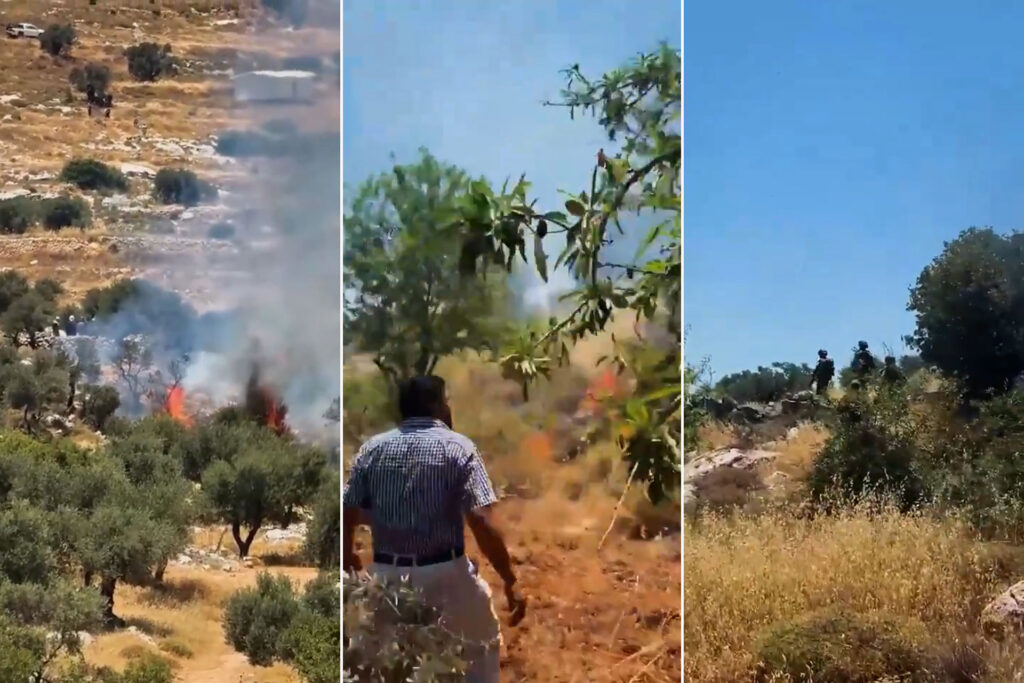3 Palestinian children were injured by Israeli occupation forces’ bullets in the town of Beit Furik, east of the city of Nablus, in the northern West Bank. Palestinian farmers and those in solidarity with them were also suppressed and prevented from accessing the lands to pick olives in the village of Barqa, east of Ramallah.
The Palestinian Red Crescent Society said, in a brief statement, that its crews transported to the hospital a 14-year-old child injured by live bullets in the foot, another child of the same age injured by live bullets in the thigh, and a 16-year-old child injured by live bullets in the foot.
She explained that the injuries occurred during confrontations during the occupation forces’ storming of the town of Beit Furik.
Dozens of arrests
In another context, the Israeli occupation army arrested 4 Palestinian youths near the Nabi Musa area, south of the city of Jericho, according to the official Palestinian News Agency (Wafa).
The agency said that the occupation forces arrested 4 young men near the Nabi Musa area, without knowing their identity until now, and subjected them to field inspection and investigation before arresting them.
In this regard, the Palestinian Prisoners’ Club said in a statement that, during the past 48 hours, the occupation arrested at least 30 Palestinians in the occupied West Bank, including former prisoners.
He explained that the arrests that took place during the past two days were distributed among the governorates of Hebron (south), Nablus, Salfit, and Jenin (north), Ramallah (central), Jericho (east), and Jerusalem.
He added that widespread raids and harassment accompanied the arrests, in addition to attacks and threats against the detainees and their families, field investigations, and sabotage and destruction of citizens’ homes.
The Prisoners’ Club indicated that since the start of the ongoing war of extermination on the Gaza Strip and the comprehensive aggression against the occupied West Bank on October 7, 2023, the number of detainees has exceeded 11,300 Palestinians from the West Bank, including Jerusalem.
Suppression of farmers and solidarity workers
In the context of Israeli violations, the occupation army on Sunday prevented Palestinian farmers and solidarity activists from reaching the lands to harvest this year’s olive crop, in the village of Barqa, east of Ramallah, in the central West Bank.
The Wall and Settlement Affairs Authority (official), the Ramallah Governorate, and other institutions had called for participation in a volunteer day in the village to help the people pick olives and protect them from settler attacks.
The head of the Barqa village council, Sayel Kanaan, told Anadolu Agency that “the army prevented farmers from entering the Al-Marj area, claiming that it is adjacent to the Oz Etzion settlement outpost,” and that “large forces from the occupation army came to the area, while settlers were stationed on a nearby hill.”
Kanaan pointed out that the village of Barqa is constantly exposed to attacks by settlers, who prevent farmers from picking their olives, and have previously set fire to fields and trees, noting that the occupation provides protection to the settlers, and even doubles the suffering of the village people by closing the roads leading to it.
The farmers affirmed that they were determined to withstand the arbitrary occupation measures and settler attacks, and stressed that they would continue to protect their lands and access them to care for them and harvest their olive crops.
It is worth noting that the village of Barqa has been experiencing heated confrontations since October 7, 2023, during which settlers are burning homes, vehicles, and fields owned by Palestinians, and stealing or killing sheep, according to Kanaan.
The village is surrounded by 4 settlement outposts: Oz Etzion and Givat Assaf from the western side, Govat Yaakov from the southern side, and Ramat Migron from the eastern side, while it is separated from the Palestinian communities from the northern side by the 60 settlement road.
For his part, the head of the Wall and Settlement Affairs Commission, Moayed Shaaban, said that the occupation army and settlers have carried out more than 70 attacks on olive pickers in the West Bank since the start of the olive season (about a week ago).
He added that Israel is seeking to evacuate the Palestinian areas in favor of the settlement outposts that now control thousands of dunams.
According to data from the Palestinian Wall and Settlement Resistance Commission, settlers carried out 2,777 attacks in the West Bank since the start of the genocide in Gaza on October 7, 2023, until October 7, which led to the martyrdom of 19 Palestinians and the displacement of 28 Palestinian Bedouin communities inhabited by 292 families, including 1,636. Individually.
In parallel with the war of extermination on the Gaza Strip, the Israeli army expanded its operations, and settlers escalated their attacks in the West Bank, including East Jerusalem, which resulted in the martyrdom of 759 Palestinians and the injury of about 6,250, according to official Palestinian data.
With American support, the ongoing Israeli genocide in Gaza for a year has left more than 142,000 Palestinians martyred and wounded, and more than 10,000 missing, amid massive destruction and famine that killed dozens of children and the elderly.
Tel Aviv continues its massacres, ignoring the UN Security Council resolution to end them immediately, and the orders of the International Court of Justice to take measures to prevent acts of genocide and improve the catastrophic humanitarian situation in Gaza.

